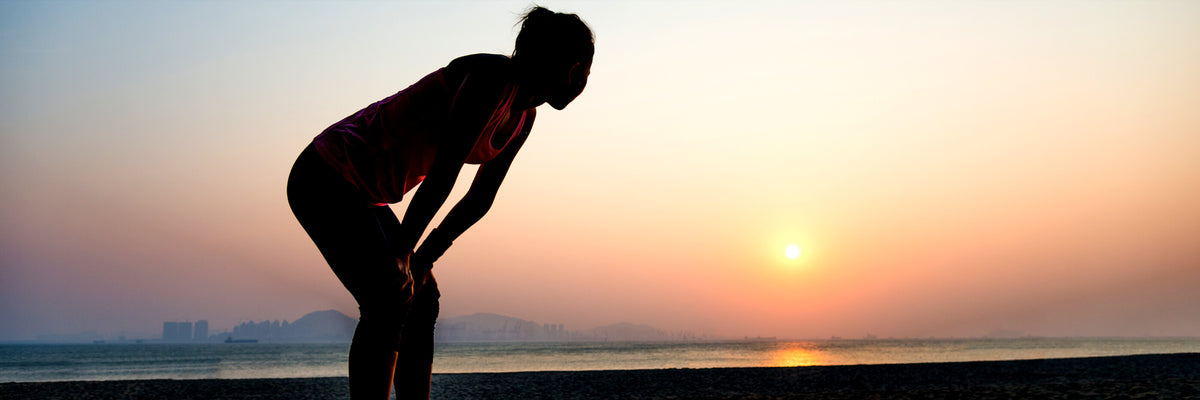Your Cart is Empty

I'm an ultra runner, a mother, a wife, a personal trainer and a nurse. I also have a Chronic Bowel Disease and Invisible Disabilty. Yes that's right, you can't tell to look at me, but I have a disability that effects my daily life.
I have had Ulcerative Colitis for over 14 years now, but I don't let it get in the way of my life if I can help it. Don't get me wrong, occasionally it wins, but I come back more determined.
I let the disease get the better of me for a while, but after a few years of being unwell and getting more unfit, I decided to start running. It was something I could do anywhere, for any amount of time, and alone.
I entered a race and was shocked at how unfit I had become. That was the start of a journey that took me from couch to 5k to running 50 mile races.
To keep my motivation going, and to raise awareness and funds for the charity Crohn's and Colitis UK, I took on the challenge of running every day for a year, and to run every distance from 5k to marathon.
So, in 2016 after 6 months of novice running the challenge began. I loved almost every day and now I'm hooked. I ran at least 1 mile each day and managed to run 3 marathons in the year. I also raised almost 3k and lots of awareness too.
It's not always easy though, and in 2018 I ended up in hospital not long before the Manchester Marathon for 8 days with the high possibility of having my large bowel removed. Manchester was a no-go, but luckily my bowel was saved.
My disability is a type of Inflammatory Bowel Disease or IBD (The 2 main types are Crohn's and Colitis).
IBD has a huge impact on both physical and mental health. In a flare you can lose a lot of blood, have a lot of pain, have urgency to go to the toilet (And when I say urgent, I mean URGENT) and become anaemic, dehydrated, fatigued and also have associated problems such as eye problems, joint pain, osteoporosis and many other complications. This can all lead to poor mental health as it's a life long battle.
This disease won't go away and no one medication works for all. The cause is not yet known or fully understood, but what we do know is that it's linked to the body's immune system attacking itself. Excuse me body....My bowel is not a foreign object! Calm down!
So this disease led me to the trails. During a time of flare I was too worried about having an accident in areas where lots of people were around. On the roads, in built up areas I would panic if I felt the urgency come over me, then I would panic that I may need to go to the toilet even if I didn't need to at that time. But I wasn't about to let my IBD stop me from running if I wasn't too unwell.
Being out on the trails is not only my preferred type of running now, but I can go and get lost, physically and mentally, find new routes that look differently in the 4 seasons and also find a bush if I need to. This can lead to my husband worrying about my safety and whereabouts, I've also had a few unsavoury people shout things at me too though.
My top tips for running and surviving the trails with UC:
1. Take tissues. Whilst you may find a large leaf - it just isn't the same! (If you know, you know). On the same theme, wear black tights/shorts. Black hides everything. You'll worry less. Trust me, light colours are not your friend when you have a flare up. Activewear with a high waistband is more comfortable if you're bloated. They are also great for my friends with a bag.
2. Hydrate, it's a biggie for IBD runners. Drink enough pre-run (or the days leading up to a big run) so you're not starting off dehydrated, sip to thirst and rehydrate after. I find that some rehydration sports tabs really help with this.
3. Fuel for long runs should be tried and tested. Don't try something new on race day. Certain foods or sports nutrition will be gentle, and others may cause you to run for the port-a-loo's.
4. Be kind to yourself, don't worry about pace or distance. Sometimes you just can't run as far, or as fast. You have to listen to your body, and that's OK.
5. Be safe. I like to run in a group and also solo, I also mix it up and don't plan my routes that often, So if you're like me, take a run angel with you. This is a wearable safety alarm which when activated emits a loud sound as well as notifying up to 3 people of your exact whereabouts (could also scare those cows that you just know are plotting to stampede).
6. Don't underestimate rest days. When training for a long race, it's easy to feel guilty about rest days, but remember this is when your body heals and becomes stronger.
7. Join a group of like-minded people. I run in a group twice a week and they know about the basics of my disease. I have also joined IBD Runners and Riders on Facebook, a closed group who understand it all completely.
Whether you want to run 1 mile or 100 miles. Good luck. You've got this!


